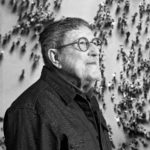Genovés, Juan

Born in Valencia in 1930, Juan Genovés emerged as a prominent Spanish painter and graphic artist, who eventually established himself as a key figure within the figurative movement in Spain.
Since his time at the Valencia School of Fine Arts, he was a restless painter concerned with revitalizing Spanish art as well as the role of art and the artist in society.
He started his career exploring informalism and matter painting, but in the 60s he shifted his style and focused on figuration. Genovés' strong believe that art should be transformative and committed to aiding the environment led him to be part of different artistic groups. In 1950 he joined the group \"Los Siete\", in 1956 the group \"Parpalló\" and in 1959 he became one of the founders of the group \"Hondo\".
His first exhibition was held in 1957, and from then on he participated in innumerable collective exhibitions and had more than eighty solo exhibitions all over the world. In 1959 he was awarded a grant which enabled him to travel to France, Belgium and Holland.
The memory of the events of the spanish Civil War were vividly engrained in his memory and very present in his \"political realism\", which, in the midst of the Franco regime, pushed his committment to advocate for freedom. Consequently, he followed an anti-academic and intimate line, which was far from the traditional training he acquired in school.
Over time, his artistic expression evolved towards a critical realism, which incorporated technical and iconographic elements related to pop art. From that moment, his work focused on representing the individual against the current society. In other words, he wanted to depict the contrasting relationship between individuality and the social environment in which this individuality lived. His most characteristic works illustrate both isolated individuals and crowds of people who, through a cinematographic frame, appear in situations that allude to repression, persecution and violence.
In 1976, in the midst of Spain's democratic transition, he painted a picture titled \"El abrazo\" (The Embrace), currently in the collection of the museum Reina Sofia in Madrid. This image became a poster for Amnesty international and a powerful symbol during Spain's political transition. In the 1980s he painted urban landscapes with a cold chromatic palette of blues, greys and ochres.
Throughout his career he received various awards including the Honourable Mention at the Venice Biennale (1966), the Gold Medal at the San Marino Biennale (1967), the Marzotto Prize (1968) and the National Plastic Arts Prize (1984).
Nowadays, Genovés' works are part of important international museums, such as the MOMA, the Art Institute of Chicago, the Museum of Modern Art in Barcelona, the National Centre of Contemporary Art in Paris and the National Gallery in Rome.
Juan Genovés died on the 15th of May 2020 at his home in Madrid.